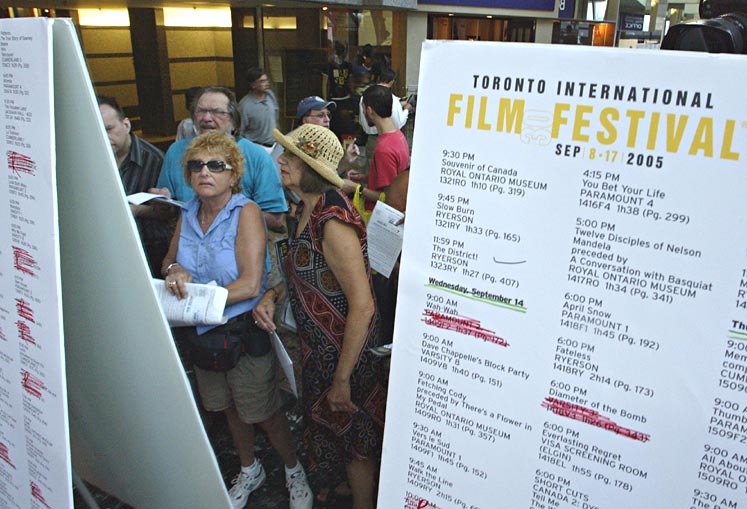TORONTO – Is the Toronto Film Festival the most important in the world, or does it only seem that way? In recent years I’ve described it as second only to Cannes. Now the Toronto critic Liam Lacey says flatly: “Toronto now has the most important film festival in the world — the largest, the most influential, the most inclusive.” Yes, you say, but he is a Canadian, so of course he thinks that. Lacey is ready for you: “One reason the Toronto festival has probably not received its full recognition is, frankly, because it takes place in Canada.”
Frankly, only a Canadian would think that. Toronto is all he says it is, and that’s that. Part of the festival’s importance comes simply because of timing: Oscar Season opens this weekend, and in the next 10 days we will likely see most, maybe even all, of the major 2006 Academy Award winners. Cannes, held in May, is well-timed to launch “summer pictures,” which are precisely the kinds of movies that do not require festivals. The most important American festival, Sundance, serves an entirely different function, focusing on indie films. Toronto programs indies and mainstream, experimental and blockbuster, long and short, new and old – it programs everything it can get its hands on that seems to be any good, and doesn’t stop there.
There was a time, 10 years ago, when Cannes was rumored to be considering a switch to the autumn. But the hard reality, even then, was that if the distributors of the major Oscar Season pictures had to choose, they would choose Toronto. Cannes backed off from the confrontation. In the decade since, Toronto has indeed earned Lacey’s praise as the most important, largest, most influential, most inclusive festival, and he could have added another crucial superlative: The cheapest.
Movies premiere in Toronto for the same reason so many are filmed here. The Canadian dollar is cheaper than the American dollar, although not as cheap as it once was, and prices by any standard are lower. To launch a film at Cannes can cost twice or three times as much as giving it a good push-off at Toronto. Just getting up in the morning, you can save 75 percent on your first cup of coffee, and a stalwart Canadian bran muffin will cost you half as much as a croissant.
There is another factor in Toronto’s ascendancy. From the very first years, the festival has been aimed primarily at audiences of – well, moviegoers. To see a film at Cannes you allegedly must possess some sort of industry credential. Toronto is open to the public. Ordinary people with ordinary funds can gorge on movies; standing in line at passport control, I chatted with a woman who showed me her list of 40 films. It’s a rare Toronto screening of even the most obscure film that isn’t sold out.
This year, the hot tickets will include several movies already considered Oscar favorites. Philip Seymour Hoffman is said to have a lock on a nomination for his “Capote,” in which he makes the author simultaneously twee and hard-boiled. Joaquin Phoenix is tipped to fill the “Ray” slot with “Walk the Line,” his extraordinary performance as Johnny Cash, and Reese Witherspoon is no less favored as June Carter Cash. Ang Lee’s “Brokeback Mountain” stars Heath Ledger and Jake Gyllenhaal as two cowboys who have a lifelong love affair and keep it a secret in a 1960s Wyoming that would murder them if it found out.
Slightly darker horses include Neil Jordan’s “Breakfast on Pluto” starring Cillian Murphy, the Scarecrow from “Batman Begins,” as an Irish transvestite whose only protection is his eccentric innocence; Cameron Crowe’s autobiographical “Elizabethtown;” David Cronenberg’s “A History of Violence” with its Oscar-worthy Viggo Mortensen performance as an ordinary dad with a frightening past; Roman Polanski’s “Oliver Twist” with Ben Kingsley as Fagin; and Scott McGehee and David Siegel’s remarkable “Bee Season,” which combines the Kabbalah and a spelling bee and might get a nomination for a young woman named Flora Cross.
Charlize Theron gives another powerful and moving performance in Niki Caro’s “North Country,” about a woman mine worker who files the first class action suit for sexual discrimination. Morgan Freeman and Kevin Spacey star in David J. Burke’s “Edison,” a movie I know nothing about except that it’s a film noir involving newspapers and any movie with those actors and also Piper Perabo and LL Cool J is not likely to be boring. Atom Egoyan’s “Where the Truth Lies” stars Kevin Bacon and Colin Firth in a murder mystery involving a showbiz team not a million miles away from Martin and Lewis. Gwyneth Paltrow reaches a career high in John Madden’s “Proof,” also starring Anthony Hopkins, Hope Davis and Jake Gyllenhaal in a thriller about higher mathematics.
I have already seen most of these movies. What lies ahead for me? Last year at this time “Ray,” “Kinsey,” “Yes,” “Palindromes,” “The Sea Inside,” “Undertow” and “Hotel Rwanda” were only rumors to me. I write on Wednesday night, and will see three or four new movies tomorrow, and be astonished by completely unexpected treasures. I permit myself to be delighted until I reflect that in the real world, titles like this do not open every weekend, or play everywhere, or get much support, and there are perfectly nice people who are going to see “Deuce Bigalow: European Gigolo” under the impression that it is a movie.












